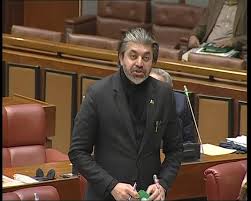Ali Muhammad Khan was born on November 30, 1977, in the town of Mardan, Khyber Pakhtunkhwa, Pakistan. He comes from a family deeply rooted in the region’s socio-political landscape, which played a significant role in shaping his interest in politics. His early education was completed in Mardan, where he showed a keen interest in social issues from a young age. Later, he pursued a degree in Civil Engineering from the University of Engineering and Technology (UET) Peshawar, a field that helped him develop analytical skills and a practical approach to problem-solving.
Political Career Beginnings
Ali Muhammad Khan’s entry into politics was inspired by his desire to bring positive change to his community and country. He initially joined the Pakistan Tehreek-e-Insaf (PTI) party, led by Imran Khan, which was known for its stance against corruption and its focus on justice and reform. His commitment to the party’s cause and his ability to connect with the grassroots earned him recognition within the party ranks.
In the 2013 general elections, Ali Muhammad Khan was elected as a Member of the National Assembly (MNA) from NA-10 (Mardan-II). His victory was seen as a significant achievement for PTI in Khyber Pakhtunkhwa, a region traditionally dominated by other political parties. His performance in the National Assembly was marked by his active participation in debates and his focus on issues affecting his constituency.
Role in Pakistan Tehreek-e-Insaf (PTI)
As a key member of PTI, Ali Muhammad Khan has played an essential role in shaping the party’s policies, especially in the areas of education, health, and social welfare. He has been a vocal advocate for the rights of the people of Khyber Pakhtunkhwa and has consistently raised concerns about the lack of development in the region.
His dedication to PTI’s vision of a corruption-free Pakistan earned him a position as the Minister of State for Parliamentary Affairs in the federal cabinet. In this role, Ali Muhammad Khan was responsible for coordinating between the government and the parliament, ensuring that legislative processes were carried out efficiently. He worked closely with other ministers and parliamentarians to push forward the government’s agenda, particularly in the areas of transparency and accountability.
Advocacy and Legislative Contributions
Throughout his tenure in the National Assembly, Ali Muhammad Khan has been an outspoken advocate for various social causes. He has consistently raised his voice on issues such as the rights of women, education reform, and the need for improved healthcare services in Pakistan. His speeches in the assembly often reflect his deep concern for the underprivileged segments of society and his commitment to bringing about legislative changes that benefit them.
One of his notable contributions was his involvement in the passage of the Khyber Pakhtunkhwa Domestic Violence Against Women (Prevention and Protection) Act, which aimed to protect women from domestic violence and provide them with legal recourse. His efforts in this regard have been widely appreciated by human rights organizations and the public alike.
Challenges and Criticism
Like many politicians, Ali Muhammad Khan has faced his share of challenges and criticism. His strong stance on certain issues has sometimes put him at odds with members of the opposition and even within his own party. However, he has remained steadfast in his beliefs and has continued to work towards his goals despite the obstacles.
Critics have often pointed to his party’s performance in Khyber Pakhtunkhwa, questioning the effectiveness of PTI’s governance in the region. However, Ali Muhammad Khan has defended his party’s record, highlighting the improvements in education, health, and infrastructure under PTI’s rule.
Public Image and Influence
Ali Muhammad Khan is known for his humility and approachability, traits that have endeared him to his constituents. He regularly interacts with the people of his constituency, listening to their concerns and addressing their issues. This connection with the grassroots has made him a popular figure in Khyber Pakhtunkhwa and has solidified his position as a trusted representative of the people.
His influence extends beyond his constituency, as he is often seen as a spokesperson for PTI on national issues. His articulate and passionate speeches in the National Assembly and on various media platforms have made him a respected voice in Pakistani politics.
Future Prospects
As a seasoned politician with a track record of dedication and service, Ali Muhammad Khan’s future in Pakistani politics appears promising. He is expected to continue playing a vital role in PTI and in the country’s political landscape. His focus on social welfare, education, and the rights of the underprivileged will likely remain central to his political agenda.
With the upcoming elections, Ali Muhammad Khan’s experience and popularity will be crucial for PTI as it seeks to maintain its influence in Khyber Pakhtunkhwa and across Pakistan. Whether as a member of the National Assembly, a minister, or a party leader, Ali Muhammad Khan’s contributions to Pakistani politics will undoubtedly continue to shape the country’s future.
Conclusion
Ali Muhammad Khan’s journey from a small town in Khyber Pakhtunkhwa to the corridors of power in Islamabad is a testament to his dedication, hard work, and commitment to public service. As a prominent figure in Pakistan’s political arena, he has made significant contributions to the legislative process and has been a strong advocate for the rights of the people. His influence in PTI and his connection with the grassroots make him a key player in the country’s political future.
To get more insights, click here.


